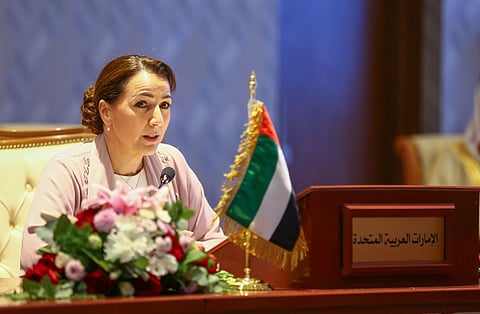UAE Commends GCC's Consensus to Ratify Kigali Amendment to the Montreal Protocol
The United Arab Emirates has expressed its appreciation of the consensus reached by GCC nations to proceed with the ratification of the Kigali Amendment to the Montreal Protocol on Substances that Deplete the Ozone Layer.
The consensus takes into consideration the unified position of GCC and the annex to the mechanisms for ratifying the Kigali Amendments.
This came during the participation of Her Excellency Mariam bint Mohammed Almheiri, UAE Minister of Climate Change and Environment, UAE, at the 25th meeting of the GCC Committee of the ministers responsible for climate and environment affairs. The meeting was hosted by the Sultanate of Oman in Al Jabal Al Akhdar, Al Dakhiliyah Governorate.
Addressing the meeting, Her Excellency Almheiri said: "The phase-out of hydrofluorocarbons (HFCs) is one of the most important topics we have been discussing over the past years and to reach a consensus. Our cooperation has yielded results, and the UAE applauds the agreement to ratify the Kigali Amendment to the Montreal Protocol. The UAE also hopes to work to speed up the ratification process with the GCC nations.”
Her Excellency said that reaching the consensus highlights the commitment of GCC nations in reducing emissions and mitigating the effect of climate change. She invited all ministers and officials to attend the upcoming COP28 Conference in the UAE, which will have a significant impact on showcasing the region's stature in promoting global climate action.
The Kigali Amendment will help curb up to 0.4°C of global warming in this century while continuing to protect the ozone layer. The amendment will substantively contribute to the goals of the Paris Agreement.
HFCs are organic compounds frequently used as refrigerants in air conditioners and other devices as alternatives to ozone-depleting substances controlled under the Montreal Protocol. While HFCs themselves do not deplete the ozone layer, they are extremely potent greenhouse gases with global warming potentials that can be three times higher than carbon dioxide.
The agenda of meeting included sessions on several key themes such as the environmental landscape and trends in the GCC countries, the decision regarding non-tariff restrictions on the environment, the decisions of the Ministerial Council at its 154th session to establish a Gulf pavilion at COP28, other strategic plans of the Committee and the Gulf Environmental Portal.
They also discussed cooperation with the United Nations Environment Programme (UNEP), and the need to develop an international legally binding instrument on plastic pollution, as well as the Convention on the Conservation of Wildlife and their Natural Habitats in the GCC countries, the 16th Conference of the Parties to the United Nations Convention to Combat Desertification, and how to strengthen cooperation between the GCC countries and other nations.


